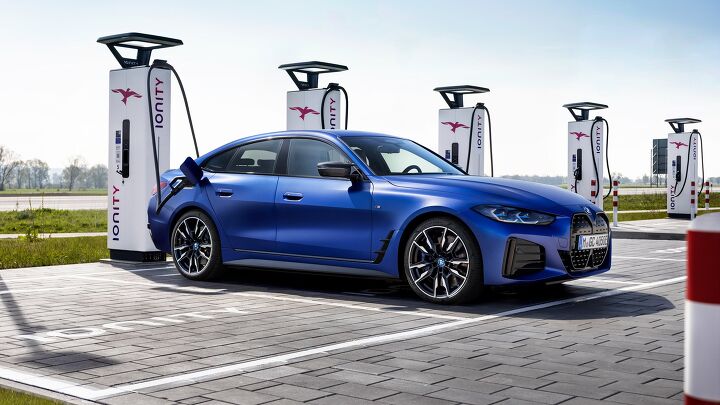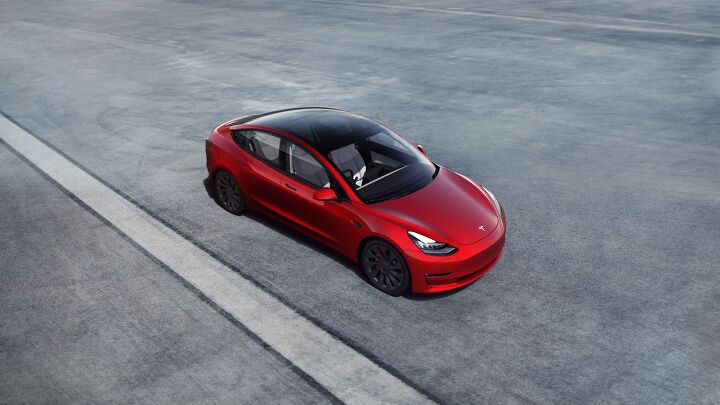#FederalEvTaxCredit
BMW is Willing to Pay to Attract Customers from Other EV Brands
Tesla might not be the most dominant EV maker in the world, but it’s on top of the market here in the United States. Legacy automakers like Ford and General Motors are in the hunt, but so far, no one has been able to topple Tesla’s top spot. BMW is hoping to take some of the shine off of Tesla’s crown with a new incentive that gives buyers a $1,000 discount to buy one of its new EVs.
The Base Tesla Model 3 Is Now Even Cheaper
For a while, it seemed like Tesla's values would never come back to Earth. Buyers lucky enough to get a new EV from the automaker were flipping their cars for way more than the asking price, and many people overpaid as a result. Tesla started cutting prices earlier this year, making all models more attainable, and now the company has slashed the price of an entry-level Model 3 to below $40,000.
General Motors Asks Government to Change Rules on EV Tax Credits
General Motors is asking the federal government to reset the federal EV tax credit system, effectively requesting a personal favor. As one of the first manufacturers to get an electric vehicle to market that people actually wanted to buy, GM hit the 200,000 cumulative EV sales cap in 2018. While customers could still get money back through April of 2020, the automaker exhausted its allotment of $7,500 subsidies before most of its rivals.
Now it wants to see the government press the reset button on the program under a pretext of fairness. GM executives are claiming that companies investing in electrification shouldn’t be handicapped by not getting additional money from taxpayers. It seems anything but fair, frankly. Though it should be said that all-electric models have a poor track record in terms of profitability. The Chevrolet Bolt certainly didn’t make any money, however, GM CEO Mary Barra has said new versions of the model will be capable of turning a profit.
Congress Says Nay to Expanding EV Tax Credits
Prior to Congress taking the rest of the month off to relax and presumably gear up for an impeachment trial, they first had to settle their year-end tax package. Automakers were hoping that would include an extension of electric vehicle tax credits, but it was a doomed proposition.
An extension was initially included in the bipartisan Driving America Forward Act, which manifested this spring, before being incorporated into the Democrat-friendly GREEN Act (Growing Renewable Energy and Efficiency Now). That got it through the House but not the Republican-controlled Senate, which wasn’t interested.
While the current $7,500 EV tax credit remains in place, Tesla and General Motors have both reached their 200,000-vehicle quota. Naturally, they (and other automakers) lobbied for an expansion, one which would have seen a $7,000 credit kept in place until a manufacturer sold 600,000 electric automobiles. Several Republican lawmakers openly shared their distaste for the plan, though few more openly than Senator John Barrasso of Wyoming, who had an opposing bill — called the Fairness for Every Driver Act — interested in reducing subsidies on the grounds that EV credits have already done enough.
Can EVs Survive Without a Government Check or Tax Break? Not in Denmark
Despite the protestations of many members of the green car crowd, dollars and cents do seem to play a major role in the motivation to purchase an electric or plug-in hybrid vehicle. Right now, EV proponents and domestic automakers are worried the U.S. won’t renew the green car tax credit — a segment-boosting incentive that shaves thousands off the price of a new electric vehicle.
Some would argue if green car buyers are really devoted to the planet’s health, purchase price wouldn’t be an issue (assuming the buyer’s bank balance is sufficient). Individuals being what they are, motivations and circumstances will vary. Still, no one can argue that a tax credit doesn’t sweeten the pot, just as dealer incentives on the hood of a truck help move sluggish inventory.
In Denmark, however, lawmakers have discovered that once-steady sales of EVs will slow to a trickle when green vehicle buyers are treated like regular car buyers.
Tesla's 'Free' Model X for Referrals Probably Eligible for Federal Tax Credit
Details on Tesla’s “free” Model X for the first 10 referral buyers have been few since the beginning. First it appeared that the program would be limited by time, then it appeared it would be limited by country, now it appears that it’ll be limited by continent.
The first person to refer ten friends in each sales region— North America, Europe, and the Asia-Pacific — will receive a free Founder Series Model X.
But even more unclear is exactly how Tesla will give its winner their new Model X. Depending on how that happens, there are very few scenarios in which the new Model X owner (with 10 friends wealthy enough to buy new Model S cars) wouldn’t qualify for up to $7,500 back from the feds.


















Recent Comments